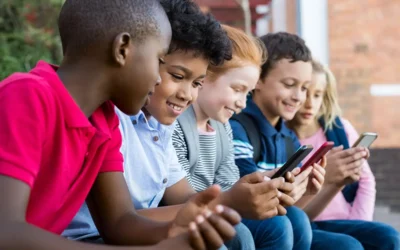I applaud all schools who have taken up the essential cause of protecting student privacy online during this pandemic. In fact, a positive outcome of this horrible experience is the triggering of necessary improvements in the selection and use of technology at schools which has been way overdue.
Schools who continue to select and use technology on a whim because it looks “new and shiny” or “everyone is using it” simply won’t be able to anymore, especially with parents more aware of the imminent dangers in this space. The mere fact that many of these platforms – the likes of Facebook, Instagram, Snapchat, Zoom and YouTube – were built for general use, not school/student use, really should have been a warning sign to all education and government departments, associations and school IT professionals. Perhaps if this matter had been taken more seriously in the early days, we wouldn’t now be hearing these kinds of stories.
Schools and parents together can act as gamekeepers!
Our own eSafety Commissioner recently posted on LinkedIn:
I’m not sure if I am a “poacher turned gamekeeper” but I believe in the promise of technology but think we all need to do more to reduce the seemingly rampant peril.
Only six months ago we were still witnessing public online and social media channels being excessively used by schools to assist in parent engagement (although I question how many parents actually visit a school’s Facebook page…) and school marketing, with little thought on privacy and the consequences for the children featured in the photos and videos. Even some State Education Departments had mandated a parent must consent to a child’s image being shared on social media or miss out on general school activities like sport, drama, camps, excursions! At what point did we enable social media to dictate, at the grass root level, what our child’s experience would be at school?
Now, the tide is turning and those big tech companies which everyone regarded as “so friendly” are finally being seen as foe, even referred to as “bullies” when it comes to Facebook and Google’s responses to ACCC recommendations.
It is great to see more schools taking expert advice on online protection strategies and how to conduct due diligence before deciding on which technology platforms to use with students. A good example being an online guide on how to protect students’ privacy during video conferences shared by a professional association for school technology leaders in the US – still relevant here.
I must reiterate that it is not the responsibility of teachers to conduct this due diligence, they are not IT professionals. At the same time, IT leaders must get a seat at the school executive table and be involved in important strategic discussions on safety and privacy.
Wouldn’t it be great if you could plug-in an online tool and whizz-bang everything in the world was right again?!
Yes, but sadly technology alone can never fix compliance, especially when it comes to child safety. It would be like sending Apollo 11 to the moon in 1969 with no human intervention – let’s just say it would never have happened.
When using technological tools to support school compliance, like pixevety, schools must maintain the traditional notions of accountability and governance. Technology can and has been uniquely designed to support compliance activities at schools, but it still requires the necessary organisational elements to ensure a successful and sustainable implementation, like governance, policies, procedures and educated staff.
Parents, take this opportunity to ask your child what technology they use at school and are they comfortable using it?
A recent New York Times article stated “Parents play an important role in validating their children’s worries about privacy and can help their kids practice speaking up about their concerns”.
It is also a parent’s responsibility to ask schools what technology they are requiring students to use and how the data is being collected, stored and used in the future. It is our responsibility to check in on any anxiousness our children might be feeling when using school-directed online tools for learning etc. Again, the New York Times article states “Are they worried that the teacher may record their class and, if so, are they concerned about how securely that recording will be stored and for how long? Are they anxious about being seen on camera or whether a video platform is safe? Are they scared that other students might take snapshots of the class or that their classmates will judge their home? Students who appear on video may also fear that their teachers will judge their appearance. That is why teachers should check in privately with their students to make sure that they are interpreting their students’ facial expressions and body language correctly… A student who giggles, for example, might be doing so out of discomfort and not because he finds something funny.”
In fact, it is important for parents to gauge how important student privacy is to their school. I recently learned that some schools are still using content from the likes of Google to educate students on how to protect their digital footprints i.e. “brought to you by Google”. In fact, at the end of these videos, children are being told “If you keep your digital footprint safe you too could get a great job at a company like Google”. Firstly, Google is partly responsible for our kids needing to ensure their digital footprints are protected and, secondly, if this isn’t blatant marketing to children, I don’t know what is? Surely there are more reputable content providers in this space, such as the eSafety Commission, who can teach children about online safety as gamekeepers not poachers?
I do hope you find this article interesting. Feel free to reach out to us at pixevety if you have any questions.



